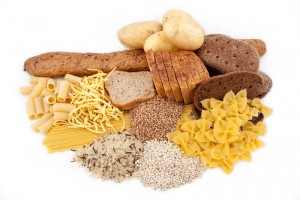We’ve all heard it: “Carbs are bad and make you gain weight, and you need to be on a low-carb diet to achieve your fitness goals.” If there’s one myth in the fitness and nutrition industry that needs debunking, it’s the crazy idea we should deprive our body of carbohydrates. With so much conflicting information and the media showcasing low-carb diets, you may be confused about what’s true and what’s not. Let’s review some key facts to guide you.
First, it’s important to understand what carbohydrates are and what they do for us. Our bodies need three main nutrients, also called macronutrients, to survive and thrive: carbohydrates, protein and fat. They are needed in large quantities for normal growth and development; in fact, 45-65% of your daily intake should come from carbohydrates.
But what do carbs do for us, and why do we need such a large quantity of them? Carbs are the body’s preferred energy source. When you consume carbs, your body breaks them down into molecules of glucose that are used as energy to perform all of life’s functions. Not only does this energy help you to sit, stand, move and sleep — it also drives your brain function. Accordingly, restricting carbs causes your brain to feel cranky and unfocused and can be harmful to learning, thinking and memory.
So, what happens if we consume more carbs than we need? Carbs your body does not immediately use for energy are stored as glycogen in your liver and muscle cells. Your body then uses the glycogen like it’s in a pantry, taking it and breaking it down into glucose molecules for energy when needed. This is not a bad thing as long as you are not excessively consuming without any sort of activity.
Similar to certain foods in a pantry going bad if not eaten, stored glycogen will eventually convert to fat for long-term storage. However, this undesirable result could happen with overconsuming any food group: If the calories you put into your body outweigh the calories you burn with activity throughout the day, weight gain and fat storage will occur.
It’s vital to understand what foods fall within the carbohydrate category. Carbs typically get a bad rap because the foods that come to mind first are refined, such as white bread, cookies, cakes, chips and crackers. These are fine in moderation but provide no nutritional value or fiber for your body. The carbs that should come to mind first and be consumed on a daily basis are fruit, vegetables whole grains, and dairy. Filling up on proper portions of these healthy carbs will keep you satisfied longer and provide your body with the nutrients and fiber it craves.
For ideas on healthy carbohydrate options, check out the chart below. If you’re looking to improve your carb consumption while still enjoying bread, crackers and treats every so often, follow the 80/20 rule. Aim to eat nutrient-dense carbohydrates 80% of the time, and allow yourself to have refined carbs 20% of the time — guilt-free. It’s all about balance.
The take-home message here is that healthy carbs are not the culprit of weight gain, nor are they the enemy. They are a macronutrient that keeps you alive, focused and energized — and that’s pretty incredible.

by Megan McKee

